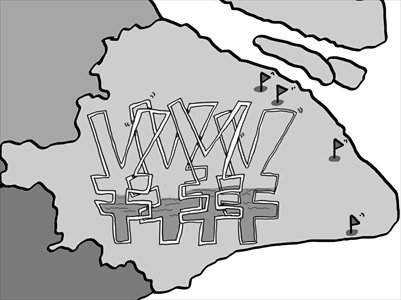
Illustration: Chen Xia/GT
Newcomers to Shanghai have been shocked by the consecutive high-temperature days in the past two months. This summer may be the record hottest period in the city's history.
We hope that the city's electricity grid can cope with the increased demand and guarantee all of us have air conditioning both at home and in the office. For the top administration of the city, this month is also "hot" with the State Council's announcement on July 3 of the trial free trade zone (FTZ) scheme in Pudong New Area.
Media reports have hailed the decision as a golden opportunity for Shanghai, given that other cities across China, and indeed the world, are struggling to find ways to boost local economic development.
Media reports have also been keen to push the "threatening theory." For example, columnists from influential newspapers and magazines claim that according to their inside sources, administrators in the municipalities of Tianjin and Chongqing, and the cities of Zhoushan in Zhejiang, Xiamen in Fujian and Guangzhou in Guangdong are unhappy with the decision by the central government.
They see themselves as unprivileged in the face of Shanghai's opportunity as they have to wait for the next round of promotions. It's understandable that local government officials are eager to make achievements during their tenure. The more positive their political records, the better the chance they have to be promoted to further realize their ambitions. As the saying goes, "He who doesn't want to be a general isn't a good soldier." It's reasonable for officials to look for opportunities to spur local economic and social development.
But at the same time, we shouldn't forget the famous Mencius line: "The right time, geographic advantage and harmonious interpersonal relationships are the three decisive factors for a commander to win a battle." Business is just like a battlefield. The traditional wisdom from our ancestors is still worth heeding. Administrators in other cities need to carefully consider why Shanghai was chosen.
It's a city with a history of opening to the outside world and also with experience in managing ports like Waigaoqiao, according to Lian Ping, chief economist at Bank of Communications. Shanghai is also home to many financial talents which are badly needed for the experimental zone. Shanghai has set a target of being a global economic, financial, trade and shipping center by 2020. So it already has a track record of attracting and retaining top financial talent. With a large number of registered multinationals in the city, Shanghai has plenty of experience conducting international business.
And Shanghai administrators enjoy a reputation for efficiency. The city's economic statistics prove that it's a suitable place for a trial run of the FTZ.
Shanghai Party Secretary Han Zheng said, "Shanghai is at a critical juncture for seizing opportunities. Only a group of responsible cadres can guarantee a successful development transfer."
A source close to the issue told the Global Times that Shanghai is under a lot of pressure and is treading very carefully as everyone is watching closely.
Indeed, Shanghai is a pioneer in experimenting the trial FTZ; it's not just a narrow strategy for the local economy. The central government was very cautious in choosing Shanghai's Pudong as a pilot area since the FTZ will be a very important policy for the whole country, experts claimed.
Given this, administrators in other regions need a calm head and more patience to wait and see how Shanghai performs. Shanghai has been given a coveted opportunity that comes with simultaneous challenges and pressures. When other cities are fully prepared, chances will knock at their door too.
Both the Chinese and overseas media should be more objective and rational in reporting and analyzing instead of leading readers to a preset conclusion which can provoke hostile sentiments among various parties.
The existing nearby FTZs of Hong Kong, Singapore and Busan have also been included by certain media in the "list of places that are threatened."
But well-educated expatriate businessmen and diplomats just shrug off this theory. They believe that the media is overstating the competitive element. Global practices have proved that FTZs serve as an economic booster, so it's inevitable that more countries will try. Why not Shanghai in China?
Expats that I've spoken to say that the wise choice for both domestic and foreign companies is to assess the situation and go with the flow. Take a ride and also a share of the market from the opportunity.
Competitors do not have to be on opposite sides. Greater cooperation can be sought in a harmonious environment.
I, together with many others, am looking forward to the day that we can buy top-end duty free big brands in Shanghai.
The author is the managing editor of Global Times Metro Shanghai. fengyu@globaltimes.com.cn

